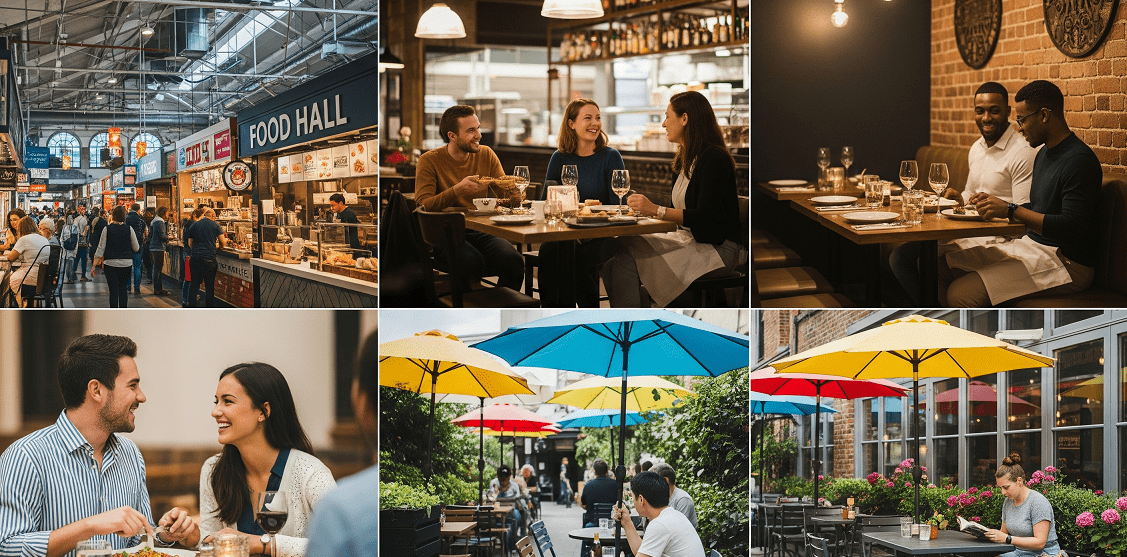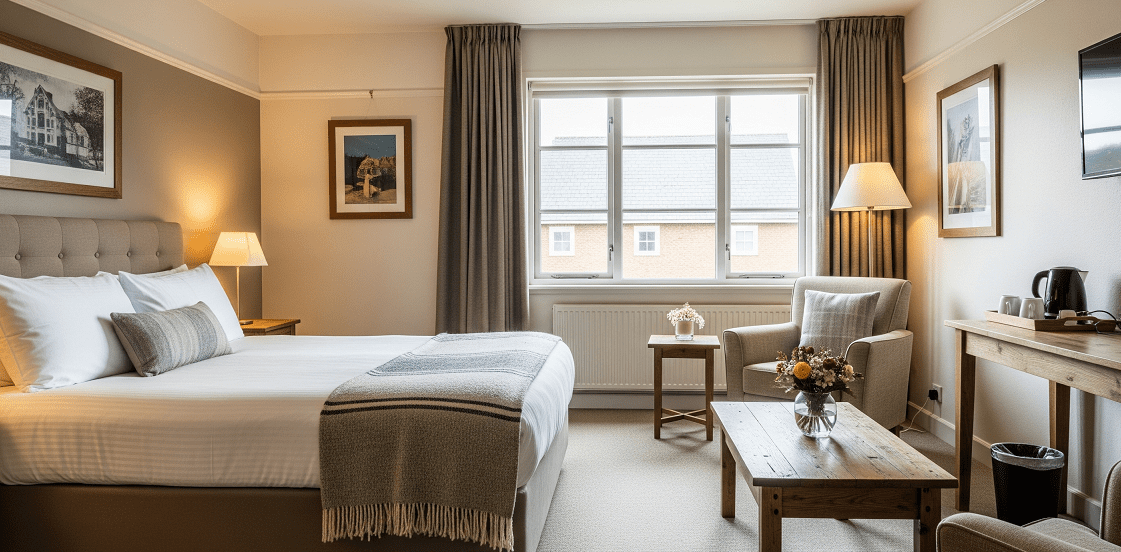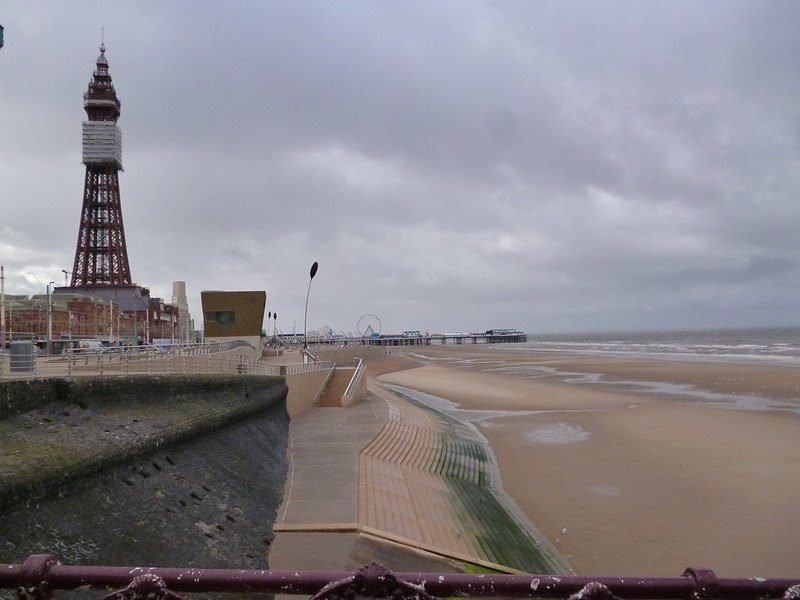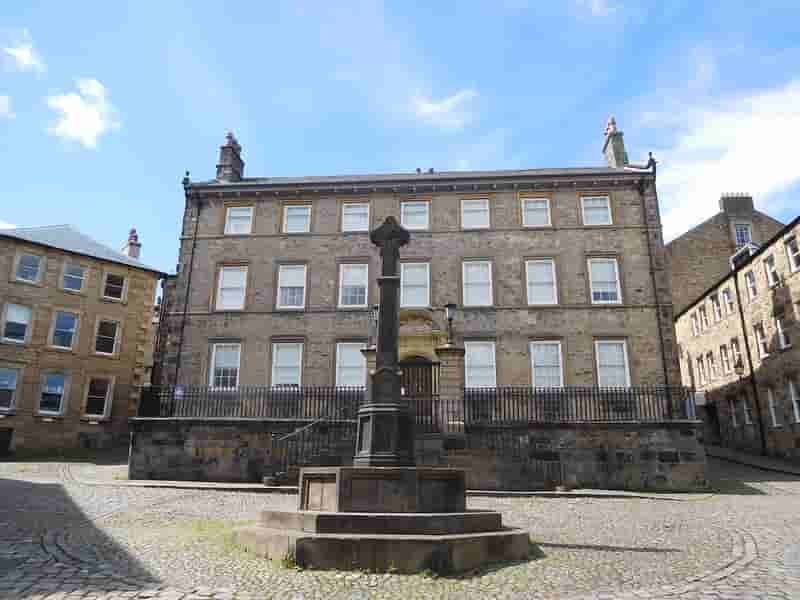Updated 20/07/2025
Disclosure: The following article contains affiliate links. This means that if you book through my links, I may receive a small commission. There is no extra cost to you.
Key Takeaways
- Blackpool is a classic British seaside town with a lively mix of attractions, entertainment, and nostalgia.
- Major sites include Blackpool Tower, Pleasure Beach, Sandcastle Waterpark, SEA LIFE, Blackpool Zoo, and three distinct piers.
- Outdoor activities range from seaside strolls to rides on heritage trams and donkey rides on the beach.
- The Illuminations, Lightpool Festival, Air Show, and Christmas By The Sea are standout annual events.
- Dining options are varied: Harry Ramsden’s for fish and chips, Beach House Bar & Bistro for modern dishes, Michael Wan’s Mandarin for Cantonese, plus vegetarian and vegan choices at many spots.
- Accommodation suits all budgets, from luxury hotels like Boulevard and Imperial, to family-run guesthouses and nearby campsites.
- Travel to Blackpool is simple, with direct trains from London and other cities, regular National Express coaches, good motorway links, and access from Manchester Airport.
- Booking transport and accommodation in advance is best, especially at peak times or during big events.
- Pack for mixed, often unpredictable weather—even in summer; waterproofs and layers are recommended.
- Visiting in spring or autumn means fewer crowds and comfortable temperatures.
- Eco-friendly travel options include train journeys, car-sharing, cycling, and local buses and trams.
- Families benefit from child-focused attractions like Nickelodeon Land, Gruffalo & Friends Clubhouse, and the zoo.
- Solo travellers and culture fans enjoy venues like Showtown, Winter Gardens, and quieter corners like Stanley Park.
- Local specialities include fresh fish and chips, Blackpool rock candy, and sticky toffee pudding.
- Safety is good, but usual UK city precautions apply; the town is wheelchair-friendly and generally easy to navigate.
- Check event calendars for unique experiences; highlights include festivals, dance contests, and vibrant nightlife.
- Plan ahead, make reservations for meals and attractions where possible, and enjoy the friendly, inclusive vibe.
Welcome to Blackpool, the vibrant jewel of Lancashire’s coastline! Nestled on the Irish Sea, this iconic seaside town has been captivating visitors for over a century with its blend of traditional British charm and modern entertainment. From the towering silhouette of Blackpool Tower to the dazzling lights of the Illuminations, Blackpool offers a unique mix of nostalgia, adventure, and cultural experiences. Whether you’re a family seeking fun-filled days out, a solo traveller exploring hidden gems, or an adventure seeker chasing thrills, Blackpool has something for everyone. In this comprehensive guide, we’ll take you through the best things to do, where to eat, where to stay, how to get there, and insider tips to make your trip unforgettable. So, pack your bags, grab your camera, and let’s dive into the magic of Blackpool, Lancashire!
Introduction to Exploring Blackpool
Blackpool, located in the heart of Lancashire, England, is a seaside resort town that epitomises the classic British holiday. Known for its iconic Blackpool Tower, seven miles of golden sandy beaches, and the world-famous Blackpool Illuminations, this destination is a haven for travellers seeking fun, relaxation, and a touch of nostalgia. The town’s scenic beauty, with its bustling promenade, historic piers, and stunning views of the Irish Sea, creates a vibrant backdrop for an unforgettable getaway.
Blackpool’s appeal lies in its versatility. Families flock to the amusement parks and child-friendly attractions, while solo travellers and couples enjoy the cultural spots, lively nightlife, and quieter corners of the town. With a rich history dating back to the 18th century, when it became a spa resort for wealthy visitors, Blackpool has evolved into a modern destination that still retains its traditional charm. Whether you’re strolling along the promenade, enjoying a show at the Winter Gardens, or riding the historic trams, Blackpool promises a holiday filled with excitement and memories.
In this guide, we’ll explore the best things to do in Blackpool, recommend top dining and accommodation options, provide travel information, and share local tips to ensure you make the most of your visit. Let’s get started!
Things to Do in Blackpool

Blackpool is a treasure trove of activities, offering something for every type of traveller. From thrilling rides to cultural experiences and seasonal events, here’s a detailed look at the top attractions and activities in Blackpool, Lancashire.
Outdoor Activities and Attractions
Blackpool’s outdoor attractions are the heart of its appeal, combining classic seaside fun with modern thrills. Here are some must-visit spots:
- Blackpool Tower: A landmark since 1894, the Blackpool Tower is a must-visit. Climb 380 feet to the Blackpool Tower Eye for panoramic views of the coastline, or brave the SkyWalk, a glass platform offering a thrilling perspective of the promenade below. The Tower also houses the Blackpool Tower Ballroom, a stunning venue for dance enthusiasts, and the Blackpool Tower Circus, featuring acrobats and clowns. Don’t miss the Dino Mini Golf for a quirky, family-friendly activity. Learn more.
- Blackpool Pleasure Beach: One of the UK’s top amusement parks, this 40-acre site boasts over 145 rides, including the iconic Big One (the UK’s tallest rollercoaster), Revolution (the first looping rollercoaster), and Valhalla (voted the world’s best water ride). Families will love Nickelodeon Land, with rides and shows featuring characters like SpongeBob SquarePants. Book tickets.
- Sandcastle Waterpark: This indoor waterpark is perfect for all ages, featuring 18 slides, a wave pool, and a spa area for adults. It’s an ideal spot for rainy days or a break from the beach. Visit the website.
- SEA LIFE Blackpool: Dive into an underwater world with over 2,500 marine creatures, including sharks, turtles, and penguins. Interactive exhibits make it educational and fun for families. Explore SEA LIFE.
- Blackpool Zoo: Home to over 1,000 animals, including lions, tigers, and elephants, this zoo also features beautiful gardens and a children’s farm. It’s a great day out for animal lovers. Check out the zoo.
- Heritage Tram Tours: Experience Blackpool’s history with a ride on one of the town’s historic trams or open-top trams along the promenade. It’s a nostalgic way to see the sights. Find out more.
- Blackpool’s Piers: Blackpool’s three piers—Central, North, and South—each offer unique experiences. Central Pier features arcades, fairground rides, and bars, while North and South Piers offer donkey rides, penny sliders, and stunning sea views. Discover the piers.
- Stanley Park: A peaceful retreat with beautiful gardens, a boating lake, and a model village. It’s perfect for a relaxing stroll or picnic. Learn about Stanley Park.
- Coral Island: A lively arcade with games, a donkey derby, and family-friendly entertainment. It’s a great spot for indoor fun. Visit Coral Island.
- Gruffalo & Friends Clubhouse and Peter Rabbit Play Zone: These interactive play areas are designed for young children, offering themed adventures and activities. Check availability.
Cultural Attractions
For those interested in Blackpool’s rich history and cultural offerings, these attractions provide a deeper look into the town’s heritage:
- Showtown: This museum celebrates Blackpool’s entertainment history, with interactive exhibits on magic, dance, comedy, and more. It’s a fascinating stop for culture enthusiasts. Explore Showtown.
- Winter Gardens: A historic venue hosting theatre shows, concerts, and events, including the famous Blackpool Dance Festival. Check the schedule for upcoming performances. View events.
- Madame Tussauds: Get up close with wax figures of celebrities, historical figures, and characters from Strictly Come Dancing. It’s a fun and interactive experience. Book tickets.
Seasonal Events
Blackpool’s calendar is packed with events that add extra sparkle to your visit:
- Blackpool Illuminations: Running from late August to early January, this iconic light show transforms the 8km promenade into a dazzling display of colour and creativity. It’s a must-see for visitors of all ages. Plan your visit.
- Blackpool Air Show: Typically held in August, this event features breathtaking aerial displays by the Red Arrows and other aircraft. It’s a thrilling spectacle for families and aviation enthusiasts. Check dates.
- Christmas By The Sea: From November to January, the Festival Headland transforms into a festive village with an outdoor skating rink, chalet stalls, and light installations. Find out more.
Recommendations for Different Travellers
- Families: Blackpool is a paradise for families, with child-friendly attractions like Nickelodeon Land, the Gruffalo & Friends Clubhouse, and Peter Rabbit Play Zone. The Pleasure Beach and Sandcastle Waterpark offer fun for all ages, while SEA LIFE and Blackpool Zoo provide educational entertainment.
- Solo Travellers: Explore cultural gems like Showtown or the Winter Gardens for a dose of history and entertainment. Take a leisurely stroll along the promenade or visit Stanley Park for a peaceful escape. The North Pier is a great spot for quiet reflection with sea views.
- Adventure Seekers: Thrill-seekers will love the rollercoasters at Pleasure Beach, particularly the Big One and Valhalla. The Sandcastle Waterpark’s slides and the Blackpool Tower’s SkyWalk offer additional adrenaline rushes.
Places to Eat in Blackpool

Blackpool’s dining scene is as diverse as its attractions, offering everything from traditional British fare to international cuisine. Whether you’re craving classic fish and chips or a fine dining experience, you’ll find plenty of options to suit your taste and budget.
Top Dining Recommendations
- Harry Ramsden: Located beneath Blackpool Tower, this restaurant is famous for its seaside-inspired menu, featuring fresh seafood, classic fish and chips, and a great selection of cocktails. It’s a perfect spot for a traditional meal with a view. Visit Harry Ramsden.
- Beach House Bar & Bistro: A stylish, independent restaurant on the promenade, offering international cuisine with a focus on fresh, locally sourced ingredients. Its beachside setting makes it ideal for a relaxed meal. Book a table.
- BANK Bar & Grill: A modern, family-run restaurant in the heart of Blackpool, known for its tasty British dishes and lively atmosphere. Learn more.
- HIVE: An artisan coffee shop and bakehouse perfect for light bites, pastries, and speciality coffee. It’s a great spot for breakfast or a quick snack. Visit HIVE.
- Turtle Bay: This Caribbean-inspired restaurant offers bold flavours, from jerk chicken to curries, paired with rum cocktails and a vibrant atmosphere. It’s just a short walk from the North Pier. Check the menu.
- The Upper Deck: Nestled within a casino, this award-winning restaurant offers a unique dining experience with an elegant Art Deco setting and a menu crafted by head chef Jack Bradley. Book now.
- Michael Wan’s Mandarin: A Blackpool institution for over 50 years, this restaurant serves delicious Cantonese cuisine with a focus on fresh ingredients. Reserve a table.
- The Cartford Inn: Located just outside Blackpool, this 2-Rosette restaurant offers fine dining with stunning views of the Fylde countryside. Explore the menu.
Local Specialities
- Fish and Chips: A quintessential Blackpool experience, available at numerous chippies along the promenade. Look for spots with long queues, as they’re often the best. Harry Ramsden is a top choice for this classic dish.
- Blackpool Rock: This hard candy stick with “Blackpool” running through it is a traditional sweet treat. Visit local shops to watch it being made or pick up a stick as a souvenir.
- Sticky Toffee Pudding: A popular dessert at many cafes and restaurants, perfect for satisfying your sweet tooth.
Dietary Accommodations
Blackpool caters to a variety of dietary needs, with many restaurants offering vegetarian, vegan, and gluten-free options. Some highlights include:
- The Cartford Inn: Offers a range of vegetarian and vegan dishes alongside its fine dining menu.
- Mi Casa Su Casa: A Mexican restaurant with a variety of vegetarian and vegan options, perfect for a flavourful meal.
- Marco Pierre White’s New York Italian: Features vegetarian and vegan dishes, including pastas and pizzas made with fresh ingredients. View the menu.
- HIVE: Provides vegan-friendly pastries and snacks for a quick bite.
For those with specific dietary requirements, check menus in advance or contact restaurants directly to ensure they can accommodate your needs.
Accommodation in Blackpool

Blackpool offers a wide range of accommodation options to suit every budget and preference, from luxury hotels to budget-friendly campsites. Here’s a breakdown of the best places to stay:
Luxury Hotels
- The Boulevard Hotel: Located on Ocean Boulevard at Pleasure Beach Resort, this modern seafront hotel features 120 stylish rooms, including junior suites, park view suites, coastal suites, and family rooms. Many offer scenic views of the Blackpool shoreline or the amusement park’s rides. It’s also home to the Shoreside Conference Centre, ideal for events. Book now.
- The Imperial Hotel Blackpool: A grand Victorian hotel on the seafront, offering elegant rooms, a spa, and family-friendly facilities. Kids eat free, and the hotel hosts evening entertainment. Check availability.
- The Big Blue Hotel: Another luxury option at Pleasure Beach Resort, this hotel features contemporary design, comfortable rooms, and easy access to the park. Learn more.
Budget-Friendly Hotels and Guesthouses
- Roselea Hotel: A friendly, family-run hotel with comfortable rooms and a central location, ideal for budget-conscious travellers. Prices start from around £32 per night. Find deals.
- Belroy Hotel: A budget-friendly option close to the town centre, offering clean and simple accommodations from around £27 per night. Book now.
- Foxhall Village Guest House: Conveniently located near Blackpool’s nightlife and attractions, this guesthouse offers comfortable rooms and hearty breakfasts. Check prices.
Campsites and Caravan Parks
For those seeking a more budget-friendly or outdoor experience, Blackpool has several campsites and caravan parks nearby:
- Stanley Villa Farm: A family-run glamping site just 15 minutes from Blackpool, offering camping pods, bell tents, and wood-fired hot tubs. It’s perfect for families and pet owners seeking a rural escape. Book a stay.
- Ream Hills Holiday Park: Located in the heart of Weeton village, this park offers luxury lodges, touring pitches, and a spring-fed lake. It’s a great base for exploring Blackpool and the Lancashire countryside. Learn more.
- Little Orchard Caravan Park: A rural, family-run site with 57 touring pitches and static caravans, designed to retain the countryside’s charm. Check availability.
- Blackpool South Club Campsite: A level, open campsite with good screening from the road, offering easy access to Blackpool’s attractions. It’s pet-friendly and ideal for caravans and motorhomes. Book now.
Booking Tips
- Book Early: Especially during peak season (July and August) or during the Illuminations, as accommodations fill up quickly.
- Look for Packages: Many hotels offer deals that include attraction tickets or parking, particularly at Pleasure Beach Resort hotels.
- Consider Location: Stay near the promenade for easy access to attractions, or choose a rural campsite for a quieter experience.
- Check Reviews: Use sites like TripAdvisor or KAYAK to read traveller reviews and compare prices. Compare hotels.
How to Get to Blackpool

Blackpool is easily accessible from across the UK, with multiple transport options to suit your preferences and budget. Here’s how to get there:
By Train
Travelling by train is one of the fastest and most eco-friendly ways to reach Blackpool. Key details include:
- From London: Direct trains from London Euston to Blackpool North, operated by Avanti West Coast, take approximately 3 hours. Tickets start from £14 if booked in advance. Book tickets.
- From Other Cities: Direct services are available from Manchester, Liverpool, Birmingham, and Preston. For example, the journey from Manchester to Blackpool takes about 1 hour 10 minutes. Book tickets.
- Stations: Blackpool North is the main station, with easy access to the promenade. Blackpool Pleasure Beach has its own station for direct access to the amusement park.
- Tips: Book tickets 12 weeks in advance for the best fares, and consider a Railcard for additional discounts. Plan your journey.
By Coach
National Express operates coaches from various UK cities to Blackpool, offering a budget-friendly option:
- From London: The journey takes around 8 hours, with tickets starting from £20. Check schedules.
- Other Routes: Coaches run from Manchester, Liverpool, Birmingham, and other cities, with frequent services during peak season.
- Tips: Book early for cheaper fares, and expect longer travel times compared to trains.
By Car
Driving to Blackpool is straightforward, with good motorway connections:
- Route: Take the M6 to junction 32, then follow the M55 to Blackpool. Follow signs for South Shore to reach Pleasure Beach or the town centre.
- Parking: Blackpool offers numerous car parks, including:
- Central Car Park: 919 spaces, including 19 disabled spaces, near the town centre. Learn more.
- Talbot Road Multi-Storey: A large, central option with easy access to attractions.
- Pleasure Beach Car Parks: Three car parks with disabled parking and an electric vehicle charging point. Check details.
- Blackpool Secure Car Park: A private, secure option at 109-115 Hornby Road, near Coral Island and the Tower. Book a space.
- Tips: Use the PayByPhone app for contactless parking payments. Expect busy car parks during peak season, especially during the Illuminations. Find parking options.
By Plane
- Blackpool International Airport: A small airport with limited flights, mainly for private or regional travel.
- Manchester Airport: The nearest major airport, about an hour’s drive from Blackpool. Regular trains and coaches connect Manchester to Blackpool.
- Tips: If flying, consider renting a car or taking a train from Manchester for convenience.
Eco-Friendly Travel Options
- Train Travel: Trains produce lower carbon emissions than cars or coaches, making them the greenest option. Avanti West Coast trains offer free Wi-Fi and comfortable seating. Book eco-friendly travel.
- Car-Sharing: Share a car with friends or family to reduce your environmental impact.
- Cycling: Blackpool is bike-friendly, with National Cycle Network signs and e-bike hire available. Learn more.
- Public Transport in Blackpool: Use Blackpool Transport’s buses and trams with a three- or seven-day travel pass for easy, eco-friendly exploration. Buy a pass.
Map
Local Tips for Blackpool
To make the most of your visit, here are some practical tips based on up-to-date travel information:
- Weather Considerations: Blackpool’s coastal location means unpredictable weather, with rain and wind common, especially in autumn and winter. Pack waterproof clothing, a sturdy jacket, and comfortable shoes. Summer (June to August) offers the warmest weather, with temperatures averaging 18-22°C, but always be prepared for showers. Check the forecast.
- Peak Season Crowds: July and August are the busiest months, particularly during school holidays, with large crowds at attractions like Pleasure Beach and the Illuminations. For a quieter visit, opt for spring (March to May) or autumn (September to October), when the weather is milder, and some attractions remain open. Plan your trip.
- Lesser-Known Spots: Escape the crowds by visiting:
- Stanley Park: A serene park with gardens, a boating lake, and a model village, perfect for a peaceful retreat.
- Showtown: A unique museum offering insights into Blackpool’s entertainment history.
- Blackpool Model Village: A charming attraction with detailed miniature scenes, ideal for a low-key outing.
- Safety and Etiquette: Blackpool is generally safe, but be mindful of your belongings in crowded areas like the promenade or Pleasure Beach. Respect local customs, such as queuing politely and tipping 10-15% at restaurants if service isn’t included.
- Nightlife: Blackpool’s vibrant nightlife includes bars like Dirty Blondes and nightclubs like The Tache. Plan your return transport if staying out late, as taxis can be busy on weekends. Reddit tips.
- Accessibility: Blackpool is wheelchair-friendly, with accessible facilities at major attractions like the Tower and Pleasure Beach. Check specific requirements in advance. Learn more.
- Local Events: Check the calendar for events like the Blackpool Dance Festival or Rebellion Festival (August) for a unique experience. View events.
Conclusion
Blackpool, Lancashire, is a destination that truly has it all—thrilling rides, beautiful beaches, cultural attractions, and a warm, welcoming atmosphere. Whether you’re building sandcastles with your family, chasing adrenaline at Pleasure Beach, or exploring the town’s rich history at Showtown, Blackpool offers endless opportunities for fun and relaxation. Its vibrant dining scene, diverse accommodation options, and easy accessibility make it an ideal getaway for UK-based travellers.
To ensure a memorable trip, plan ahead by booking accommodations and tickets early, especially during peak season. Embrace the unpredictable weather with appropriate clothing, and don’t miss the chance to experience the Illuminations or a quiet stroll in Stanley Park. Blackpool’s unique blend of tradition and excitement makes it a must-visit destination that will leave you with cherished memories.
FAQs - Exploring Blackpool

What are the must-see attractions in Blackpool?
Blackpool Tower, Pleasure Beach, Sandcastle Waterpark, SEA LIFE Blackpool, Blackpool Zoo, and the Illuminations are top attractions that offer a mix of thrills, entertainment, and cultural experiences.
When is the best time to visit Blackpool?
The best time is from mid-March to October, with peak season in July and August. For fewer crowds, visit in spring or autumn.
How can I get to Blackpool from other parts of the UK?
By train: Direct services from London, Manchester, Liverpool, Birmingham, and Preston. By coach: National Express from various cities. By car: Via M6 and M55. By plane: The Nearest major airport is Manchester.
What are the best places to stay in Blackpool?
Luxury: The Boulevard Hotel, The Imperial Hotel, The Big Blue Hotel. Budget: Roselea Hotel, Belroy Hotel, Foxhall Village Guest House. Campsites: Stanley Villa Farm, Ream Hills Holiday Park.
Where can I find good places to eat in Blackpool?
Enjoy traditional fish and chips at Harry Ramsden, international cuisine at Turtle Bay, or fine dining at The Cartford Inn. Vegan and vegetarian options are available at various restaurants.
What is the weather like in Blackpool, and what should I pack?
The weather is unpredictable, with frequent rain and wind. Pack waterproof clothing, a sturdy jacket, comfortable shoes, and sunscreen for sunny days.
Are there any hidden gems or lesser-known spots in Blackpool?
Discover the tranquillity of Stanley Park, explore the entertainment history at Showtown, or visit the charming Blackpool Model Village for a unique experience.
What events or festivals are happening in Blackpool?
Don’t miss the Blackpool Illuminations (late August to early January), Lightpool Festival (October), Blackpool Air Show (August), and Christmas By The Sea (November to January).
Is Blackpool safe for tourists, and are there areas to avoid?
Blackpool is generally safe, but be cautious in crowded areas and avoid poorly lit or less populated areas at night. Consider staying in safer neighbourhoods like Bispham or Cleveleys.
How much does a trip to Blackpool cost, and are there budget options?
Costs vary, but budget travellers can find affordable accommodation at campsites or budget hotels. Many attractions offer family deals or discounts for advance bookings.
Further Reading
- Blackpool Tour Guide 2025: Discover top attractions, hidden gems, and curated itineraries in the Blackpool Tour Guide 2025 — your essential companion for an unforgettable seaside adventure.
- Strictly Blackpool: Strictly Blackpool celebrates iconic routines, dancer memories, and Tower Ballroom secrets—your ultimate guide to the show's glittering seaside spectacular.
- Blackpool History Tour: Discover Blackpool’s seaside heritage with historic photos and stories. This History Tour book offers a nostalgic journey through its streets, landmarks, and legacy.
- Blackpool Tower A History: Discover how John Bickerstaffe’s bold vision built Blackpool Tower and transformed the town into Britain’s seaside entertainment capital in this vivid history.
- Blackpool to Fleetwood by Tram: Explore the evolution of Blackpool’s tramway from 1885 to its 2012 light rail revival, with historic and modern trams featured along the route from Starr Gate to Fleetwood.
- Disclosure: As an Amazon Associate, I earn from qualifying purchases. This means that if you click on a link and make a purchase, I may receive a small commission at no additional cost to you.
📄 Download Printable Checklist: Blackpool Travel Essentials (PDF)
Blackpool Attraction
Citations
- VisitBritain - Things To See & Do In Blackpool
- VisitBlackpool - Tourist Information
- TripAdvisor - Things to Do in Blackpool
- Wanderlog - Nice Restaurants in Blackpool
- Pitchup.com - Campsites in Blackpool
- National Rail - Visit Blackpool by Train
- Blackpool Council - Parking in Blackpool
- Holidify - Best Time to Visit Blackpool



